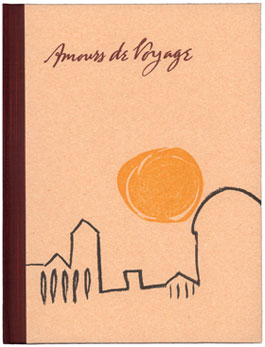| |
||||||||
Past Publications

Wood engraving by Andy English
(from The Eve of St. Agnes, 2003)
Many of the titles published by Barbarian Press in the past are now out of print. Descriptions and publication details of some of those titles are available here for your perusal.
Please note that all of these books are
OUT OF PRINT
An epistolary novella in verse
by Arthur
Hugh Clough
NOVEMBER 2007
Judges’ Award, Oxford Fine Press Book Fair, 2007
Winner, First Prize (Limited Editions) 2008 Alcuin Society Awards for Excellence in Book Design in Canada
WE BELIEVE this to be the first fine press edition of an all-but-forgotten Victorian masterpiece — Arthur Hugh Clough’s Amours de Voyage. We have always had an affection for Victorian poetry, and had been considering such poets as Swinburne and Tennyson as candidates for our ongoing series of long poems when we came upon Clough’s novella in verse. Rather too long for anthologies (which is unfortunately the way most Victorian poets are read these days), Amours de Voyage seems to have languished in the shadow of Clough’s greater contemporaries, Tennyson and Arnold. Encountering it was a vivid, freshening experience, and it seemed perfectly suited to an illustrated fine press edition. Amours de Voyage is a strange poem in many ways. It takes the form of a series of letters written by a young Englishman, Claude, as he is making the “grand tour” – in other words, as he is pursuing what Patrick Scott, the poem’s most recent editor, calls “an intellectual tourism”. In the process he falls in love (or believes he has) and is also enmeshed in the political upheavals of Italy in 1849. Clough wrote the poem from his own experience travelling in Italy that year.
The poem, however, occupies no settled or defined ground in either its form or its content: it is a novella in verse, written when the prose novel was reaching its popular apotheosis; it is an epistolary, private story written almost entirely in one voice in a time when the novel was relishing the public examination of character from many points of view, and only just before Tennyson himself was being pilloried for his use of a single-voice narration in Maud; and it is written in mixed hexameters at a period when strained experiments in classical metrical patterns were demonstrating the inadequacies of English accentual metres to sustain the lyricism of quantitative metres in Latin. The poem must have found itself extremely ill-at-ease when it was published. Indeed, many of Clough’s friends, including Matthew Arnold, expressed dislike for the poem either in matter or manner, and Clough revised it continually for nearly nine years before finally publishing it in 1858. In the end he discarded almost as much as he left in, and the discarded sections make fascinating reading.
Whatever the poem’s initial reception, to a modern ear attuned to the supple cadences of the best free verse in the work of poets like John Ashbery or Geoffrey Hill, Clough’s verse in Amours has a colloquial vivacity and freshness which makes it seem natural:
Twelve o’clock, on the Pincian Hill, with lots of English,
Germans, Americans, French, — the Frenchmen, too, are protected, —
So we stand in the sun, but afraid of a probable shower;
So we stand and stare, and see, to the left of St. Peter’s,
Smoke, from the cannon, white, — but that is at intervals only, —
Black, from a burning house, we suppose, by the Cavalleggieri;
And we believe we discern some lines of men descending
Down through the vineyard-slopes, and catch a bayonet gleaming.
This passage also demonstrates another quality of the poem which brings it easily into our own sensibility: its detached observation. The poem was written from Clough’s own experiences in Italy in 1849. He was in the fledgling Roman Republic, and knew Mazzini. He was there when the city was besieged by the French in April, he remained there through the siege and the bombardment, and he witnessed the violence of the Roman mobs in May. As a radical in politics he was committed to the cause, but he was shaken: this was not the pleasant ideological discourse of Oxford. He saw men killed, and this is recorded in the poem, in language whose panicking repetitions and stammerings are also curiously modern, familiar:
So I have seen a man killed! An experience that, among others!
Yes, I suppose I have; although I can hardly be certain,
And in a court of justice could never declare I had seen it.
But a man was killed, I am told, in a place where I saw
Something; a man was killed, I am told, and I saw something.
Such language is very far from the plangent certainties and trumpeting confidence we habitually expect to find in Victorian poetry. But of course we have at last come to see that the Victorians were neither so confident nor so assured as we had thought. In its concern with the demands of faith, the nature of love, and the necessities of political radicalism, Clough’s poem emerges from the thickets of doubt and irony in the company of such poets as Arnold, Meredith, and the Tennyson of In Memoriam. Such modernity makes us think that Amours de Voyage may only now be ready to take a place in that part of 19th century verse which lays the ground for the 20th century.
![]()
“A fascinating book and delightful lilt to the verse, though I am an appalling illiterate about poetry. The bits I have dipped into from Mary Trevellyn to Miss Roper are so emotional yet all is on the surface. I am looking forward to reading it right through. I particularly like the lightness of the calligraphy compared with the dense type.”
Hugh Harrison, Subscriber, England“What a lovely pre-Christmas surprise! The cover is excellent (I was unaware of the artistic capacities of the designer) and the printing as usual a visual treat. So another nice addition on the book shelf.”
David Bond, Subscriber, Canada
![]()
Abigail Rorer (Endgrain Editions Two) has illustrated the poem with wood engravings. Abbie is fascinated by the Victorian period, and is certainly one of the best engravers of figures working today. She is also interested in costume and has a pleasingly satirical, yet kindly, eye. She has provided four full-page engravings, two half-page ones, and some smaller images and ‘spots’ as well.
Quarter cloth with printed St-Armand handmade paper
over boards, with spine label. Bugra
endpapers. Van Dijck with calligraphic display by Martin Jackson. Zerkall
Book Soft White Wove. With eleven wood engravings by Abigail Rorer.
Broad small quarto, 9 3/8 by 7 inches [238 by 178mm].
88 pages.
125 copies.
C$390
Please Note: British, American, European, and Asian clients will be charged at the prevailing currency exchange rate at the time of invoicing.
Visit our Ordering page to order this title.
